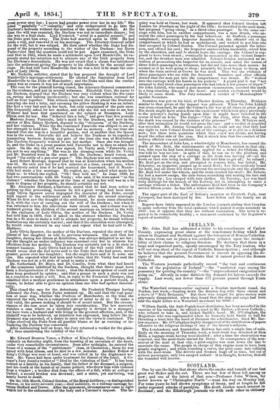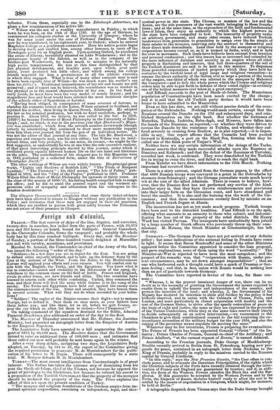SCOTLAND.
One by one the lights that shone above the smoke and tumult of our lest great way flicker And die out. There are but few of them left among us now; and one of the latest of that tera—Professor John Wilson," far better known as "Christopher NoTth "—went his way on Monday last. F9x some years he had phown sr:ARP:nue of decay, and at length be fell Wider gepested attgeks of paralp4. gjo death excites much inter* in Scotland; and the Edinburgh journals vie with each other in obituary
tributes. From these, especially one in the Edinburgh. Advertiser, we glean a few reminiscences of his active life. "Wilson was the son of a wealthy manufacturer in Paisley ; in which town he was born, on the 19th of May 1785. At the age of thirteen, he commenced his collegiate studies at the University of Glasgow ; where he was for some years under the care of Professor Jardine. From Glas- gow he was transferred, in his eighteenth year, to Oxford; where he entered liagdulen College as a gentleman-commoner. Here his native genius began to develop itself, and enabled him, among other honour; to carry off the Newdegate prize for an English poem. Upon quitting Oxford, he purchased the estate of Elleray, beautifully situated on Lake Windermere; and in the picturesque beauty of the district, as well as in the company of his brother-poet Wordsworth, he found much to minister to his naturally high poetic temperament. He was at this time distinguished by that fine physical development, and lionlike port, upon which, even until lately, years produced but little effect; and which among his college friends acquired for him a preEminence in all the athletic exercises in which they engaged. What is true of many other eminent men is said to have been equally true of Wilson—he was much more his mother 's son Than his father 8. Traditional remembrances of her wit and beauty are still preserved ; and if report can be believed, the resemblance was as marked in the physical as in the mental characteristics of her son. In the flush of early youth, he must have been the very model of manly beauty ; and his magnificent face and head would have satisfied the most fastidious disciples of the schools either of Spurzheim or Lavater. "Having been obliged, in consequence of some reverses of fortune, to abandon his romantic retreat at the ',ekes, Wilson returned to Scotland, and rejoined his mother, then living in Queen Street, Edinburgh. He adopted the law as his nominal profession, but with no fixed resolution, perhaps, to
tractie it. About 1814, we believe, he was called to the bar. In 1818, 11820?] he became Professor of Moral Philosophy in the University of Edin- burgh; and, we think, it was in the previous year that Blackwood's Maga- zine was established ; which from the seventh number downwards (though latterly by intermitting fits) continued to draw more memorable support from him than ever journal did from the pen of an individual writer. He was not the editor of that journal at any time. The late Mr. Blackwood, a sagacious and energetic man, was his own editor ; but Wilson was its intel- lectual Atlas, and very probably, in one sense, its creator,—he might be the first suggester, as undoubtedly he was at one time the sole executive realizer, of that great innovating principle started by this journal, under which it oscillated pretty equally between human life on the one hand and literature on the other. The contributions of his eloquent pen to this Magazine were in 1842: published in a collected form, under the title of Recreations of Christopher North."
The other writings of Wilson are very widely known. Hisprincipal prose works, "Lights and Shadows of Scottish Life" "The Trials of Margaret Lyndsay," "The Foresters" ; his chief poems, "The Isle of Palms," pub- lished in 1812, and the "City of the Plague," published in 1816. Professor Wilson filled the chair of Moral Philosophy for upwards of thirty years. At the close of the session of 1850-'51, his failing health compelled him to resign his office; and he did so amid the general regret and the warmest ex- pressions alike of sympathy and admiration from his colleagues in the Senatus Academicus.
The Glasgow Commonwealth complains that some thirty ticket-of-leave men have been allowed to return to Glasgow without any notification to the Police ; and intimates that these men are engaged in their old practices, which they are enabled to pursue with great safety because the Policemen are not aware of their presence in Glasgow.



























 Previous page
Previous page